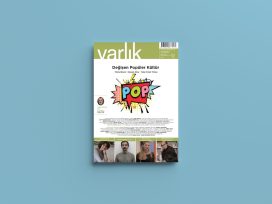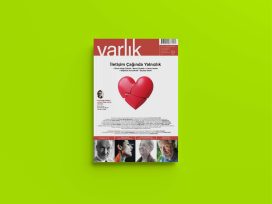Turkey and the Iraqi war
The novelist Buket Uzuner analyses in this interview the effects of the Iraqi war on Turkey as well as her countries future within the international community.
Pia Ingström: How would you introduce yourself to Finnish 1readers (nationality, profession, other important features)?
Buket Uzuner: I am a Turkish woman novelist, or, in other words; I am a fiction writer from the Eastern Mediterranean part of the world. As Roland Barthes said once: “To describe yourself is almost committing suicide” I therefore don’t want to tell more about myself, but refer to my biography instead.
PI: What is your opinion on this war?
BU: It is like a nightmare (like in my Mediterranean Waltz novel) The continuing ‘second Iraqi War’ is so very unique in many ways that it would be a perfect case study for many military schools and history lessons in the near future all over the world. Since we in our history once had the Ottoman Empire, Turkish people know very well that the word empire is related to the root of imperialism. and all empires had to invade rich countries from time to time. And as we all know, democracy and human rights were not even imagined then, much less pronounced. Today in Iraq, USA and UK are behaving like 17 centuries’ empires, but at the same time they unashamedly claim to be democratic and civilized states with a respect for human rights. No one, not even the children of the world believe that the USA and UK are trying to bring democracy to Iraq: They are killing children and civilians with their so called ‘friendly fire’ and the hunger and thirst they cause. USA and UK are acting as the 21st century’s villains before the world’s eyes! It is really heart-breaking to see poor people dying of ‘civilized bombs’ on TV channels every day and not being able to do anything except writing and demonstrating against the war. America and England are loosing respect and arouse hatred from all over the world as this war continues.
PI: How does the war affect your everyday life and immediate surroundings at the moment?
BU: Ironically I was in Hiroshima when the war started, as a guest writer by Japan Foundation’s invitation. It was very sad to walk around in the streets of Hiroshima where the memory of the atomic bomb still exists while the new bombs were killing children in Iraq. The second Iraqi War affects our life in Turkey very negatively in both economical and emotional aspects. We were already in a serious recession due to national debts owed to the IMF and now the economy is stagnating terribly from tourism to transportation while the war rages in our neighbourhood. All investments are stopped. As a writer, I suffer because readers are also affected by the economical crises. Our economy is badly affected due to the halted trade with the neighbouring countries and the mood of the Turkish people is mixed with anger and sadness.
PI: What is the worst- and what the best case scenario for your countries’ future?
BU: I am optimistic about Turkey’s future. This may sound ironical but we grew up here with the historical (past) and future optimism, because the present has always been difficult for us since at least five generations.
The worst case scenario would take place if we joined the war with USA. 97 per cent of Turkish citizens do not support the war but the USA may push the government into it and cause a disaster for us. We have suffered from PKK- terrorism for 15 years and 30.000 people (civilians included) died here during these very sad years. Turkish people feel uneasy about terrorism and I hope we will not get provoked into this issue.
The best scenario would be that USA and UK go back home in a very short while so that our economy can recover. But it seems this is just an utopia! Strategically, Turkey is suffering from the fact that it does not have any democratic neighbouring countries on its eastern borders. This is an uneasy situation for us both economically and politically and you can best understand this situation from your past USSR neighbouring days, I guess.
PI: Are you at present engaged in, or do you see a possibility of, any kind of protest action against the war?
BU: I was one of the writers who started campaigns against the war in Turkey in last November. I wrote on my column (Salt and Pepper in Sabah daily) an article how and why we should stand against the war. I participated in several peace meetings and demonstrations in different cities and petition campaigns. I was in Israel in December (2002) for the publication of one of my novels in Hebrew and I gave an interview to Yedioth Ahronot (the biggest paper of Israel) why we all must stand against the war. I still join the vigils, demonstrations and internet campaigns against the war. Yes, I believe if the growing amount of world peace supporters insists constantly we can make the USA and UK (or any imperialistic tyrants) sick and tired of us. Amnesty International – whom I also worked for – has the same strategy. Majorities mean power, and the Internet makes us powerful in uniting. This is the new and probably underestimated power of international pacifists. My two novels are anti- war stories but writing novels against the war is not enough; a novelist must also reach to those who do not read literature as well.
PI: Do you think that the media in your country are reliable when reporting on the war? What sources of information do you have access to?
BU: I can happily inform you that the Turkish media is very diverse at present. There are about 35 national and private channels, plus cable and satellite TV’s in Turkey. CNN International has only two foreign languages in the world: Spanish and Turkish. So we have CNN TURK which is completely state-independent. Meanwhile, the Arabic TV EL-Jezira is also available with Turkish subtitles to give different aspects of the war. There are uncountable radio stations, many of them democratic, independent and some of them (like NTV-radio and Acik Radyo) are radical opponents. One can hear opinions by Noam Chomsky and Edward Said as well as Saddam Hussein and the Bush-Blair couple on the very same day in different FM stations. The press is also very diverse; one can find mainstream daily papers and magazines as well as anarchists, radicals, or atheists and pro- Kurdish, or radical Islamic papers at the same newsstand in Istanbul. On the other hand, there are hundreds of Internet cafes in every major city in Turkey and millions of Turkish websites are discussing and/or organizing anti-war campaigns. Overall I can say that our information sources are more reliable and much more diverse here than those of the American public!
PI:Do you feel your freedom of expression threatened by the authorities in your country?
BU: I used to feel it very harshly in my youth. But especially in the last decade, the growing need for democracy and the general public tendency of being part of the European Union (EU) in Turkey started to change things in a positive way, including human rights and freedom of speech. But of course every culture has its own evolution history and takes its own time. Last year, the death penalty was abolished in Turkey and we were the first Islamic country to do so. There are still many problems and writers in Turkish prisons but at least a writer like me who is well-known and well-respected can write what she/he thinks now more than ever before in our history.
PI:How does this war affect the future of your country? What will the global effects be (concerning human rights, cultural matters etc)?
BU: As many political scientists have started to mention, a ‘new world order’ is about to be established with the second Iraqi war. It seems they are right. The power balances of the world will be changed once again. After this war, EU, UN and NATO may have different meanings than before. The Turkish culture is recently having a new experience of ‘meeting the other’ with the newly elected Islam – originated government. This is a very new and hopefully important experience for all of us living in this country. We lived as ‘the others’ for many decades and now we are learning to tolerate each other. But during emergency situations like wars, normal social procedures are interrupted. We will see what the new government’s work will be.
After the second Iraqi war, the people of the world will hopefully dare a new definition of ‘human’. When we say human rights, does it include all religions, races, sexes or only certain cultures? If we can do this, humanity wins and we may have better and really independent new UN or other international organizations which we all can respect and rely on. Maybe. Otherwise we will repeat to draw new world maps every 30-50 years with the bloods and tears of poor children.
This interview was orginally given to the Finnish Hufvudstadsbladet[Editor's note].
Published 5 May 2003
Original in English
Contributed by Varlik © Varlik Eurozine
PDF/PRINTNewsletter
Subscribe to know what’s worth thinking about.



